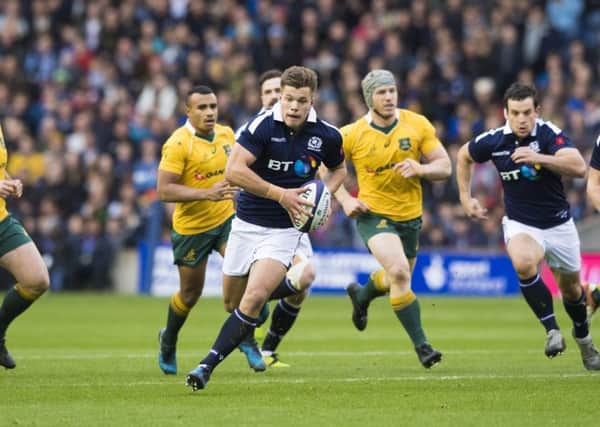Allan Massie: Arguably our best try-scoring side since 1999


Of course, in any match between two good teams, momentum will shift from time to time, and indeed Australia had had a spell on top in the first half and scored a good try then. Nevertheless, for 50 minutes Scotland looked by some way the better team. They were in control as they never really were in last year’s World Cup quarter-final. And then, despite heroic and well-organised defence, the game just slipped away from them.
Looking on the bright side, this is now a Scotland team that is capable of scoring tries against anyone. Have we ever before lost a match against Australia, South Africa or New Zealand in which we scored more tries than the opposition? I certainly can’t recall such a game.
Advertisement
Hide AdAdvertisement
Hide AdIn this context it was perhaps a mistake for Greig Laidlaw to attempt that long-range penalty in the first half. It was always a speculative kick whether he took it himself or entrusted it to Stuart Hogg. Kicking for an attacking line-out might have been the better option. Of course, if he had kicked the goal, he would have been applauded. Nevertheless it’s interesting that Ireland have recently several times turned down the chance of kicking a goal and preferred to go for the try.
Today we have two sides at Murrayfield needing a win if their autumn is not to turn sour. Argentina will have been disappointed by their performance as well as the result in Cardiff. The first half there was poor stuff from both teams, the second only a little better. The Pumas were stifled by a determined but very limited Welsh side, and can certainly raise their game. The Scotland coaches will have noticed that the Argentinian scrum was under unusual pressure, especially on the tighthead, but they won’t necessarily look for a repeat of this. After all Gethin Jenkins has always been a destructive scrummager whenever he finds himself in tune with the referee. Our inexperienced props can look forward to another demanding test; they will do well if they can hold rock steady on our own put-in.
Our inability to secure ball on the opposition restart remains as baffling as it is irritating. Tommy Seymour’s return should improve matters – if Argentina kick to his side of the field. But we are too often insecure when the ball is kicked high, and we can expect a good few Garryowens from Juan Martin Hernandez. The match may well turn on our ability to deal with them.
Still, we are making chances for ourselves and taking them more often than we have done for years, perhaps since our last championship in 1999. Huw Jones had a marvellous start to his international career, fully justifying Vern Cotter’s faith in him, but even tries which delight with their individual brilliance are made possible by the work of others – in his case by Finn Russell’s delightful little kick delivered from the outside of his boot, for the first one, and Zander Fagerson’s deft pass for the second. It was as good a scoring pass as any given in years past by his fellow loosehead Tom Smith, the last Scot to start a Test for the Lions.
It’s good to see young Magnus Bradbury winning his first cap; his form for Edinburgh has been outstanding. That said, his fellow Edinburgh flanker, Hamish Watson, discovered last week that it’s much harder to make ground against a good international side than against club sides in the Pro12 and European Challenge Cup. Still, Bradbury looks like the real thing, a rampaging back-row forward in the old mould of Finlay Calder. No matter how it goes today he surelyhas a long international career ahead of him.
Elsewhere, of course, all eyes will be on Dublin where Ireland will be seeking to repeat their marvellous win against the All Blacks. This would be an extraordinary achievement, but the odds must be against them. Nevertheless it’s possible.
Eddie Jones’s England may be on a record run of victories, one that Fiji are unlikely to check, but Ireland’s performance in Chicago was the best for years by any Six Nations side against any of the Southern Hemisphere teams, and if they can repeat it, then Ireland will surely start as favourites for the Six Nations in the Spring – especially since they play England in Dublin.
Either way there is at last some reason to think that the gap between North and South is not as wide as it seemed a year ago when no Six Nations side reached the semi-finals of the World Cup. In that connection we might ruefully remind ourselves that Argentina hammered Ireland in their quarter-final tie.